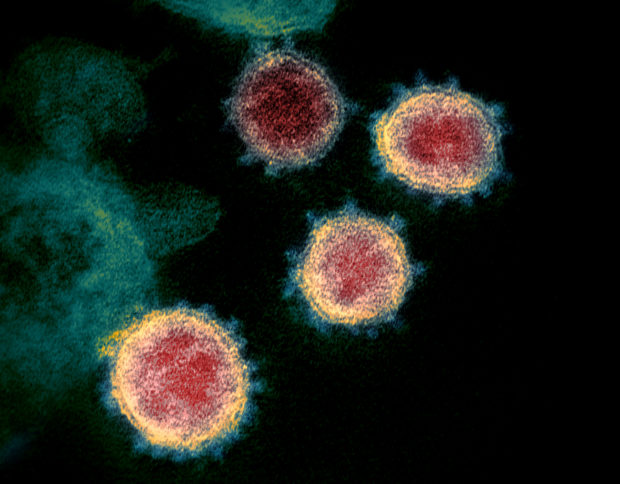OCTA says NCR’s COVID-19 trend declines; DOH notes decrease was ‘artificial’

FILE PHOTO: This undated transmission electron microscope image shows SARS-CoV-2, also known as novel coronavirus, the virus that causes COVID-19, isolated from a patient in the U.S. NIAID-RML/Handout via REUTERS.
MANILA, Philippines — The reproduction number of COVID-19 cases in Metro Manila has decreased after a week of enhanced community quarantine (ECQ), OCTA Research said Monday, even as the Department of Health (DOH) says that such decrease was “artificial.”
Based on the latest monitoring report of OCTA, the reproduction number, or the average number of persons who may be infected by a COVID-19 positive individual, is 1.61 in Metro Manila from March 29 to April 4.
“The reproduction number decreased from 1.88, and after one week of ECQ, it is clear that the lockdown has been effective in slowing down the increase in the number of new cases in the NCR,” the researchers said.
OCTA added that the goal is to bring the reproduction number down to 1 or close to 1 with the additional week of ECQ until April 11.
According to OCTA Research, the average number of new COVID-19 cases reported per day in the capital region was 5,538 over the past week, or an increase of 20 percent compared to the previous week.
Article continues after this advertisement“The NCR as a whole is now on a period where the increase in new COVID-19 cases is slowing down (from an initial phase of rapid increase that was experienced in March),” the group pointed out.
Article continues after this advertisementOCTA said an average of 26,300 tests per day was conducted in Metro Manila over the past week, with a positivity rate of 25 percent.
However, Health Undersecretary Maria Rosario Vergeire explained that the spread of the virus has not yet slowed down and that new COVID-19 numbers are really expected to decrease because some laboratories did not operate in the previous days, especially in view of the Holy Week.
“We have about 41 laboratories which did not operate in these past days, iba-ibang number of labs na hindi nag-operate [there are different laboratories that did not operate] these past days,” Vergeire said in an online press briefing.
“Yesterday I think it was 71 laboratories which did not operate and this will really affect the numbers that we are going to report in these next days,” she added.
Vergeire also reiterated that the effects of the ECQ will only be felt about two weeks from the time it will lapse.
“Itong artificial na pagbaba ng kaso, huwag po natin isipin na bumabagal ang spread ng transmission natin,” she told the public.
(Let us not think that the spread of transmission is slowing down because of this decrease in cases.)
Vergeire then appealed to COVID-19 testing laboratories to remain operational at this “very critical period in our stiuation” so that the government will be able to see actual numbers crucial in decision-making for the pandemic response, especially quarantine restrictions.
The country has so far logged a total of 795,051 COVID-19 cases, including 11,028 new infections reported on Sunday. Of the tally, 135,526 are active cases, 646,100 are recoveries, and 13,425 are patients who have died.
OCTA Research projects that the total COVID-19 cases in the country may reach over 1 million before the end of April.
JPV
For more news about the novel coronavirus click here.
What you need to know about Coronavirus.
For more information on COVID-19, call the DOH Hotline: (02) 86517800 local 1149/1150.
The Inquirer Foundation supports our healthcare frontliners and is still accepting cash donations to be deposited at Banco de Oro (BDO) current account #007960018860 or donate through PayMaya using this link.